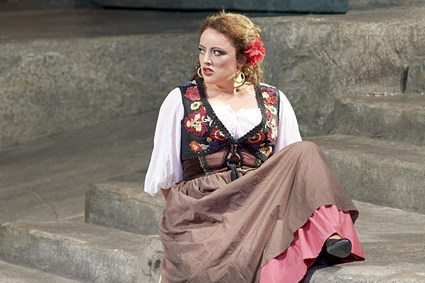| Opera Reviews | 19 April 2024 |
A rather lacklustre revivalby Moore Parker |
|
| Bizet: Carmen
Vienna State Opera 6 September 2018 |
|

Clémentine Margaine (Carmen)
|
|
|
“La Liberté” is a frequent-ringing term in Bizet’s Carmen - and alas one taken too freely by the line-up in this current revival of Franco Zeffirelli’s sadly jaded 1978 production. The ensuing decades have witnessed many a cast, and this latest sees a number of role debuts in the house - unfortunately, none particularly auspicious. Frédéric Chaslin got off to a cracking start in the opera’s opening bars and seemed intent upon providing variety - both in rhythm and tempi - throughout the course of the evening. Ultimately, however, to little true effect - often appearing contrived, and too often at odds with the stage. Indeed, the entire proceedings carried an air of “survival” - with each soloist bent on making their mark rather than uniting to serve the drama and the score. Giving her house debut in the title role, Clémentine Margaine (an already seasoned Carmen) brought to the role a solid, well-schooled mezzo - albeit one essentially monochrome and lacking in any striking individuality in timbre or personality. In looks and voice, she falls somewhere between Elena Obraztsova, the original Carmen in this production, and the more recent Agnes Baltsa - while lacking the former’s voluptuous tone and the latter’s fire and focus. But the essential failings of this Carmen were a deficit in dramatic and musical instinct, with liberal deviations from the score’s notation in timing further weakening the case of an otherwise fairly standard reading. Marcelo Álvarez (in his first State Opera José) presented an appealing (if rather emasculated) figure - the latter underscored by an instrument no longer in pristine form, but one artistically and technically manoeuvred to ultimately create a credible and sympathetic figure. The role of Escamillo is almost more enigmatic than the opera’s title part, requiring sex appeal and bravura but also suave elegance to underscore the composer’s lines - in addition to an imposing vocal instrument of seamless breadth in tone and range. Erwin Schrott has fallen foul to the challenge in earlier attempts and now his first State Opera rendition testifies that maturity has not born the ideal fruit to meet the challenge, in a showing rather small-scaled and trite. Anita Hartig Micaëla’s received the evening’s strongest spontaneous applause following her Act 3 solo, and indeed she did perhaps deliver the evening’s most-rounded character, musically taut, and well spiked with emotion and sincerity - though again, leaning on the modest side in comparison to some predecessors. If voluminous, Sorin Coliban’s first Zuniga in the house seemed particularly feeble and hapless in character (especially in his fencing scene with José) and strikingly wayward in vibrato, while - in an otherwise bland melange of Carmen’s contraband quartet - Manuel Walser made the most striking impression with his knife-edged accuracy, burnished timbre, and strong stage personality. The child members of the company’s Opera school were exemplary in their routine, with the general chorus appearing depressingly uninspired. In all, a rather lacklustre revival!
|
|
| Text ©
Moore Parker Photo © Wiener Staatsoper / Michael Pöhn |
|







